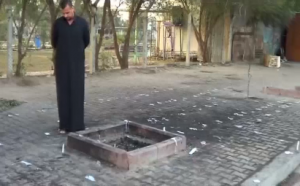
(Reuters) — Residents of Baghdad’s Sadr City neighbourhood lit candles at the scene where more than 30 people killed in a blast of motorcycle rigged with explosives on Thursday (February 27).
The motorcycle was parked in a second-hand bike market in the Shi’ite Muslim neighbourhood that was filled with people, mostly young men, when it exploded late Thursday afternoon, killing 31 and wounding 51 others, Iraqi medical and police sources said.
Blood covered the ground, storefront windows were shattered and shoes and motorcycle parts were strewn around the market, according to a Reuters correspondent at the scene. Dozens of people were screaming for information about their relatives.
Frustrated and angry, residents of the city blamed the government for absence of security in the city.
“The government is responsible for the attack. We hold police and army forces in Sadr City responsible. Few days ago, bombs went off here and two vehicles of police and army came and manned a checkpoint here to secure the area, but they left two days later leaving the area with no security and no police force to prevent motorcyclists and street vendors from gathering here or protecting them,” Abu Mustapha said.
It was not clear who was behind the bombing but violence against Shi’ites is often blamed on the Sunni Muslim Islamic State of Iraq and the Levant (ISIL), an al Qaeda-linked group.
Baghdad has been hit by wave after wave of bombings since April as the precarious peace enjoyed since the end of Iraq’s sectarian war in 2008 has unravelled.
Explosives and suicide bombs have been favoured by Sunni extremists as they seek to target Shi’ite areas and intimidate their own religious community.
The latest bloodshed comes as Prime Minister Nouri Maliki wages a war against Sunni militants in western Anbar province neighbouring Syria, and has become a base for ISIL. Despite the offensive, the pace of attacks around the country goes on undiminished.
In other violence Thursday, four people died from bombs on two different mini-buses in Shi’ite sections of Baghdad.
A militant smashed his explosives-packed vehicle into a checkpoint, killing three soldiers and wounding six others in Mushaada, a Sunni district, in northern Baghdad, police said.
In Salahuddin province, a pro-government Sunni-manned checkpoint in the town of Shirqat was hit by a bomb that killed two fighters and wounded four others, police said.
A suicide car bomber piled into the greeting house of a prominent tribal leader in Haditha in western Anbar province, killing Sheikh Said Fleah al-Usman and six of his guests and wounding 22 others, police said.
Usman had been a leader of the pro-government “Awakening” paramilitary force and a member of Haditha’s municipal council.
The manner of his death reflected the bloody struggles taking place within the Sunni community in Anbar as some support the government, others back al-Qaeda linked groups and some factions are opposed to both.
To the north in Tuz Khurmatu, a bomb in an outdoor marketplace frequented by Shi’ite Turkmen killed two people and wounded 11 others.
In Diyala province to the east, which has been roiled by tit-for-tat violence between Sunnis and Shi’ites, gunmen shot dead three members of a Sunni family in Khallis as they drove home, police said. No reason was given for the killings.







